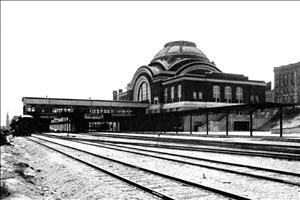On July 14, 1873, an expectant crowd gathers at Yesler Mill in Seattle to hear Arthur Denny (1822-1899) read a telegram from Northern Pacific Railroad executives R. D. Rice and J. C. Ainsworth announcing the railroad's decision on where to locate the terminus. The crowd expects the terminus to be located in Seattle, but Denny opens the telegram and reads, "We have located the terminus on Commencement Bay." Seattleites are shocked, dismayed, and angered that the planned transcontinental railroad and its coveted wealth of goods and passengers would serve Puget Sound not from Seattle but from Tacoma, then barely a village. The reaction in Tacoma is quite the opposite -- celebration. Promoter Matthew McCarver had platted Tacoma City on Commencement Bay speculating that the railroad would come there and his investment proved a good one.
The summer before, Northern Pacific Railroad officials spent a week touring Puget Sound in a steamboat looking at sites for a terminus. Various towns got into a bidding war over it. Seattle offered the Northern Pacific 7,500 town lots, 3,000 acres of land, $50,000 in cash, $200,000 in bonds and the use of the shoreline for tracks and a depot.
The railroad started building a line from Kalama on the Columbia River north toward Puget Sound. Ainsworth and Rice, charged with locating the terminus, decided on Tacoma, which was scarcely a village, because it was closer to the Columbia River and required the least amount of track to be laid. They delayed making the announcement until they secretly purchased as much of the land at Commencement Bay as they could, some distance from McCarver's Tacoma City. The Northern Pacific called its settlement, New Tacoma.
The outraged Seattleites started building their own railroad, which eventually reached the King County coal town, Newcastle. This became the Seattle & Walla Walla Railroad, governed by a company whose trustees were some of Seattle's most prominent businessmen: Arthur Denny (1822-1899), John Collins (1833-1871), Franklin Matthias (1826-1891), Angus Mackintosh, Henry Yesler (1810-1892), James McNaught (1842-1919), John. J. McGilvra (1827-1903), James. M. Colman (1832-1906), and Dexter Horton (1825-1904).
Tacoma City and New Tacoma would later unite and become Tacoma. The Northern Pacific's decision to locate the terminus at Tacoma began a long, antagonistic struggle between the railroad giant and the optimistic, but still very young city of Seattle.

